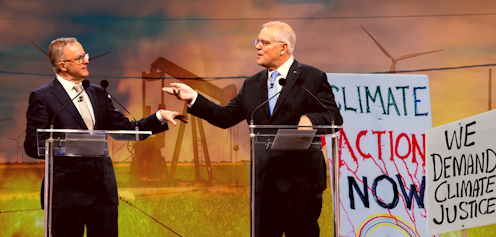
Poll after poll suggests climate change is one of the most pressing issues for Australian voters. Of the 10,000 people who responded to The Conversation’s #SetTheAgenda poll, more than 60% picked climate change as the issue most impacting their lives.
And yet, climate change has barely been discussed by either major party in this election campaign so far.
Since the last federal election, we’ve watched record-smashing floods, bushfires and heatwaves take lives and destroy livelihoods, corroding our national spirit. Disasters such as these will worsen with every fraction of a degree of global warming. Which town will be hit next? Who will be trapped by rising floodwater, or encroaching flames?
Strong national policies on climate change will help us be better prepared, bring global emissions down, and provide strong leadership in this time of crisis. So how did the major parties’ climate policies stack up? We asked five experts to analyse and grade different aspects of this enormous portfolio.
Here are their detailed responses:
Coalition
Labor
Dr Jake Whitehead is on unpaid leave from his role as a Research Fellow at The University of Queensland. He was a Lead Author of the AR6 Transport Chapter for The Intergovernmental Panel on Climate Change (IPCC), a Member of the International Electric Vehicle Policy Council, and Director of Transmobility Consulting. He has previously received government and industry funding for several sustainable transport projects, including research on both hydrogen and electric vehicles, and mobility-as-a-service. He is also holds a part-time position as the Head of Policy at the Electric Vehicle Council.
Ian Lowe is emeritus professor of science, technology and society at Griffith University. He received funding from the national energy council in the 1980s for a study of Australia's energy options up to 2030. He was president of the Australian Conservation Foundation from 2004 to 2014.
Johanna Nalau is an Australian Research Council DECRA Fellow at Griffith University and receives funding from the Australian Research Council. She is a Lead Author of the Intergovernmental Panel on Climate Change Working Group II (Chapter 15 and Summary for Policymakers) and Co-Chair of the Science Committee in the World Adaptation Science Program at United Nations Environment Program.
Matt McDonald has received funding from the Australian Research Council and the Economic and Social Research Council in the UK.
Samantha Hepburn does not work for, consult, own shares in or receive funding from any company or organisation that would benefit from this article, and has disclosed no relevant affiliations beyond their academic appointment.
This article was originally published on The Conversation. Read the original article.







